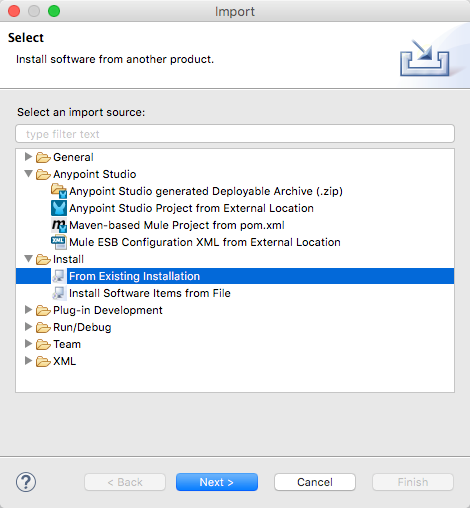Mule Runtime
Anypoint Studio 6.6 with Mule Runtime Engine 3.9.2 Release Notes
February 20, 2019
Build ID: 201902221758
Compatibility
Version: 3.9.2 EE |
|
Anypoint Studio |
Version: 6.6 |
APIkit |
Versions: 3.9.1 |
DataWeave |
Version: 1.2.0 |
MUnit |
Version: 1.6.1 (munit-studio-plugin) |
SAP Connector |
Versions: 3.2.1 |
Eclipse |
Versions: 4.7.2 |
The 6.6.0 Studio release includes some bug fixes and comes with Mule 3.9.2 runtime.
What’s New
-
New Global Mule Configuration Elements UI to open a
mule:domainxml file, displaying Global Elements and Configuration XML tabs.
This editor is now the default when openingmule:domainxml files. -
When you start projects in Studio, you can scaffold API specifications from Exchange.
Hardware Requirements
-
MuleSoft recommends a minimum of 4GB RAM on a developer workstation. As applications become complex, consider adding more RAM.
-
2GHz CPU
-
10GB free hard drive space
Software Requirements
Java Environments |
This version of Anypoint Studio requires AdoptOpenJDK 8 to run properly.
|
Operating Systems |
|
|
Running real-time antivirus protection software on your operating system might have a negative impact on Anypoint Studio performance. Although this issue is prominent on Windows, it also occurs on Linux and macOS. Although the steps to solve these performance issues vary depending on your antivirus software, a typical solution is to either allow or exclude the Anypoint Studio and java executables, the Studio install and workspace filesystem locations, or some combination of both. See examples of solutions for McAfee Viruscan, Windows Defender, and Symantec Endpoint Protection. |
|
Updating your Anypoint Studio version using the update site does not update the bundled version of the Mule runtime. |
Known Issues
-
When opening a previous workspace with projects that were created with Studio 5.1.0 or older, and which has metadata stored in disk, Studio asks you to perform an update to all the projects so that the Metadata Manager can handle the existing types and show them in your project.
You can easily import all of the external components that you had installed in your old version of Anypoint Studio through a single action. This includes connectors, runtimes, and any other type of extension added through the Anypoint Exchange or the Help → Install new software menu, as long as there are no compatibility restrictions.
Do this by selecting File→Import and then choose Install→From existing installation.

Then specify the location of your old version of Anypoint Studio in your local drive.
-
Since this version of Anypoint Studio upgrades its core Eclipse version, it is recommended to download and run the latest installer to install a fresh new full copy from The Studio download site.
-
Communication with Exchange fails when integrating with Anypoint Platform Private Cloud Edition.
Bug Fixes
-
Studio Debugger now works with Scatter Gather.
-
Fixed issue that prevented APIKit from importing all the files when having
$refreferences in a project. -
Fixed issue that prevented the transformer from showing when it references an external
dwlfile that is located outside the Mule project. -
Importing API from Design Center now generates flow scaffolding.
-
Fixed
NullPointerExceptionerror thrown when opening the Custom Type dialog from an Exchange example. -
Fixed issue that caused DataWeave Preview to break on functions stored in external resource files.
-
Fixed issue that caused Studio to crash in Windows when exceeding the max of GDI objects.
-
Fixed
javax.wsdl.WSDLException: WSDLException: faultCode=PARSER_ERROR: Problem parsing - WSDL Document -error when loading WSDL from Exchange to Studio. -
Fixed TLS error given in HTTP Connector config when HTTPS config is not selected.
-
Fixed issue that prevented moving a Poll Scope from one flow to another without creating nesting.
-
Fixed Studio validations so now MUnit launches immediately when debugging MUnit suites.
-
Fixed issue on parsing and getting query metadata.
-
Fixed issue that caused Studio 6.5.1 (as downloaded from Support Centre) starts with no update sites loaded.
-
Fixed issue that caused
xml-apisdependency to be ignored. -
Fixed issue that caused Studio to throw XML validation errors for well formed XML files.
-
Fixed issue that created an unrequired repository in
src/main/apiwhen importing an API from Design Center. -
Fixed issue that caused the validating XSD file for xlink to fail when using Studio 6.5.1 in Windows 10 + Server 2016.
-
Fixed issue that caused Studio DataWeave to parse environmental variables in regex as errors.
-
Fixed issue that caused metadata to be lost when adding anything to a Catch Exception Strategy.
-
Mimetype autocomplete now works in every possible XML tag.
-
Fixed issue where the timestamp added to mule-*.properties file caused Git merge conflicts.
-
Fixed issue that prevented metadata from being correctly populated in salesforce’s
query-allwith nested queries. -
Fixed issue that prevented users from seeing their enterprises when importing a private API from Exchange.
-
Fixed issue that prevented private APIs from changing when changing modal for import.
-
Fixed scaffolding errors when importing severals APIs.
-
Metadata tree now updates when creating a new metadata type.
Finished Tasks
-
Increased SAP version to 3.2.1.
-
Added functionality to import APIs from Exchange.
-
Fixed Windows Tests.
Enhancement Request
-
Added global configuration’s UI elements in domain projects.
-
Column labels not saved in CSV Metadata Types with no header row.
Support
-
Access MuleSoft’s Forum to pose questions and get help from Mule’s broad community of users.
-
To access MuleSoft’s expert support team subscribe to Mule ESB Enterprise and log in to MuleSoft’s Customer Portal.



